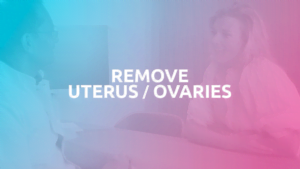
Hysterectomy is a surgical procedure to remove all or part of the uterus and sometimes the ovaries and fallopian tubes. It is a gender-affirming, masculinizing surgery. Oophorectomy is a surgery to remove the ovaries and is a gender-affirming, masculinizing surgery.
What to expect
Pre-operative:
- Bring a list of your questions and concerns to your pre-operative visits. Understanding the expectation for recovery, based on your plan, is essential.
- You will need surgery referral letters from two qualified mental health professionals.
- Drs Slobodan Milosavljević will talk to you about the surgical approach that is best for you. Most people have a total laparoscopic hysterectomy, which avoids needing a large incision.
- If you take regular medications, your clinician will tell you which ones to stop or continue at your pre-operative appointment. If you are not sure, contact your doctor.
- Do not take nonsteroidal anti-inflammatory drugs such as ibuprofen, naproxen, and aspirin two to three weeks before surgery. These medications can thin your blood and cause bleeding during surgery.
- Smoking is a relative contra-indication to hysterectomy. Because of the increased risk of infection i.a., you are advised to stop smoking as soon as possible.
- Drs Slobodan Milosavljević will also ask about any risk factors for blood clotting issues (past deep vein thrombosis or pulmonary embolism), bleeding problems (like haemophilia), or family/personal history of issues with anaesthesia.
- You will undergo a physical examination to ensure readiness for the operation.
Peri-operative:
- We will give you general anaesthesia through a vein in your arm. You will be asleep throughout the procedure and won’t feel any pain during surgery.
- Three to five tiny incisions are made on your abdomen. To inflate the area, gas will be put in your abdomen.
- A very small telescope is inserted in one of the incisions, so Drs Slobodan Milosavljević can see inside.
- Long, narrow instruments are inserted through the incisions, to detach the uterus, fallopian tubes, ovaries, and cervix. These tissues are removed through the vagina.
- The top of the vagina is closed with stitches that will dissolve over time.
- After the procedure is done, the gas is released.
Post-operative:
- After the Uterus/Ovaries removal, it is important that you follow all the recommendations of your medical team, such as medication and post-operative visits.
- Drs Slobodan Milosavljević will give you specific instructions on how to care for your incisions.
- Take pain medication as directed. Don't wait until you are in pain. It is harder to control pain if you miss, or delay, a dose.
- Wear a sanitary pad. Most people have light to moderate bleeding for up to 8 weeks.
- Your neck and shoulder may hurt. This is caused by the gas used to inflate the abdomen. The pain usually goes away within 24 hours. Drinking hot tea with lemon, moving around, and taking over-the-counter gas medications can help you feel better.
- Wear a girdle. A girdle supports the abdominal muscles.
- Walk daily at a gentle pace. Gradually increase the amount you walk each day. Walking clears the lungs to prevent pneumonia and constipation.
- Stay at home. Most people can go back to work after 2 weeks.

